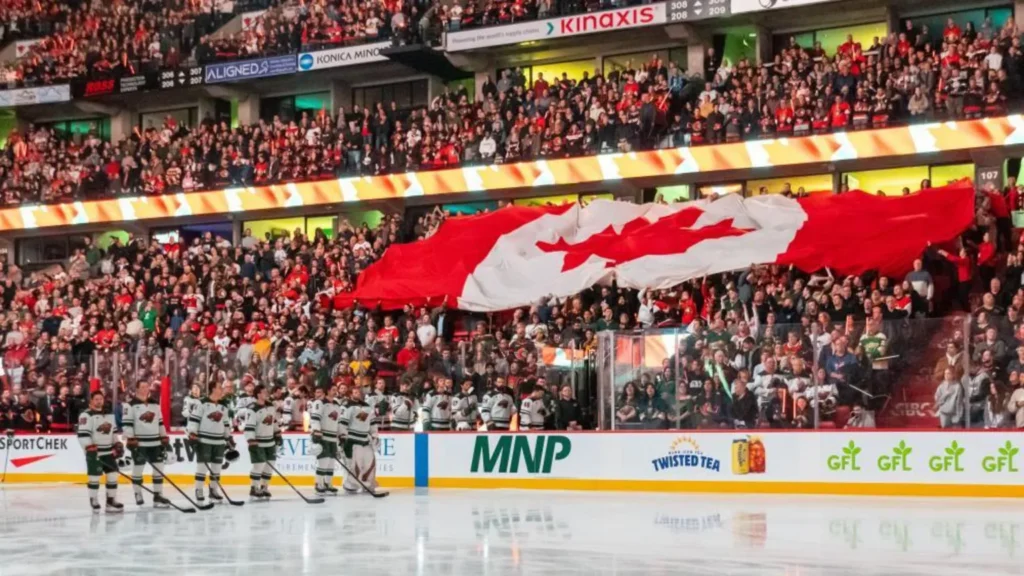Canadian sports fans booed the U.S. national anthem at multiple events over the weekend, signaling growing discontent over newly imposed tariffs by President Donald Trump. The protests, which took place at both National Hockey League and National Basketball Association games, reflect widespread frustration in Canada over the economic strain the tariffs are expected to cause.

The backlash follows Trump’s announcement of a 25 percent tariff on all Canadian imports, with a 10 percent levy on energy, set to take effect Tuesday. The move has intensified tensions between the two neighboring countries and sparked fears of a full-blown trade war.
In response to the tariffs, Canadian political leaders and citizens alike are calling for economic retaliation. Prime Minister Justin Trudeau urged unity, saying, “Now is the time to choose Canada.”
Canadians have already begun pushing back. Social media campaigns are encouraging consumers to boycott American-made products, while some grocery stores have started labeling Canadian goods to promote domestic purchasing. Others have announced travel cancellations to the U.S.
Seth Klein, a Canadian author, wrote on Bluesky that his family had canceled a planned March break trip to the U.S., stating, “It needed to be done.”
In direct response, Canada has announced 155 billion Canadian dollars, or 105 billion U.S. dollars, in retaliatory tariffs on U.S. goods. The affected products range from vegetables and clothing to sports equipment and perfume. Canadian officials have specifically targeted products from Republican-led states, such as Florida orange juice.
Additionally, some provinces, including Ontario, will pull American alcoholic beverages from store shelves indefinitely beginning Tuesday.
While the U.S. relies on Canada as its largest oil supplier, Trudeau’s administration has signaled that “all options remain on the table” for further retaliation.
The tariffs mark a turning point in relations between the two countries, raising concerns among Canadian officials about future U.S. economic policies.
Michael Ignatieff, former leader of Canada’s Liberal Party, described the situation as “a shock,” telling the BBC, “We’re in a new world where trust in America is now a fundamental question in foreign policy.”
Canada’s opposition leader, Pierre Poilievre, condemned the tariffs as “massive, unjust, and unjustified.”
“Canada is the United States’ closest neighbor, greatest ally, and best friend,” Poilievre said. “There is no justification for this treatment.”
Trudeau directly addressed Americans in his speech, highlighting Canada’s history of military alliances with the U.S. “We have fought and died alongside you,” he said.
Economists warn that Canada faces the greater economic risk in this trade dispute. TD Economics projects that a prolonged tariff battle could push Canada into recession within six months, with unemployment surpassing seven percent.
Despite speculation that the tariffs were initially a negotiation tactic for border security concessions, Trump has followed through on his threats. He has linked the tariffs to fentanyl trafficking and illegal migration and stated they will remain in place “until the crisis is alleviated.”
The Canadian government disputes the claims, noting that less than one percent of illegal fentanyl and border crossings into the U.S. originate from Canada. In response, Trudeau has offered 1.3 billion Canadian dollars in additional border security measures.
However, Trump has also cited the U.S. trade deficit with Canada as a driving factor. In a post on Truth Social, he claimed that “the U.S. pays hundreds of billions of dollars to subsidize Canada” and suggested that without this support, “Canada ceases to exist as a viable country.”
Trump has further warned of “harsher penalties” if Canada retaliates. Meanwhile, Trudeau has vowed that Canada “will fight when necessary.”
bbc.com



